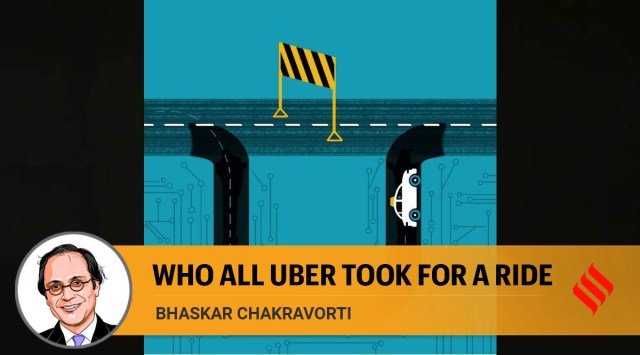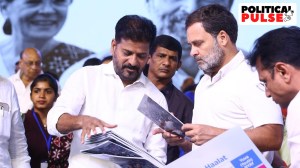- India
- International
Uber Files gives us a glimpse of Big Tech’s playbook for market manipulation
Bhaskar Chakravorti writes: It is time we reformed the education of future entrepreneurs and disruptors and the many stakeholders who enable them, to put the human cost of disruptive innovation front and center
 While Uber didn’t disclose which ticketing platforms it will partner with, it could wind up working with major aggregators such as Booking.com and Expedia Inc. (Illustration: C R Sasikumar)
While Uber didn’t disclose which ticketing platforms it will partner with, it could wind up working with major aggregators such as Booking.com and Expedia Inc. (Illustration: C R Sasikumar)Mahatma Gandhi, Martin Luther King Jr, Nelson Mandela, and now, Travis Kalanick. Finally, we have a legitimate tech disruptor — the founder of the car-sharing pioneer Uber no less — following in the footsteps of the more run-of-the-mill satyagrahis. Behind each was a simple but powerful idea: You overturn the status quo by getting the keepers of the status quo to beat you up. Kalanick, the perpetual innovator that he is, went beyond the others. He ensured that said beatings would be endured not by him, but by an army of outsourced gig workers. “Violence guarantee(s) success,” he texted. In Uber’s case, violence by taxicab drivers targeted at hapless Uber drivers — who turned the other cheek on his behalf — would serve a critical purpose: Turn public opinion and public officials away from those smelly taxicabs and in favour of Uber. “Embrace the chaos,” was Uber’s code for this strategy’s deployment in India.
Of course, Kalanick’s digital satyagraha was nuanced. Turning the other cheek may have been a potent weapon, but it needed reinforcement. The pain would pay off only when paired with a sympathetic audience with the willingness to act on your behalf. This audience would cover a wide range of actors, from the public to shapers of public opinion to public officials.
Uber’s technology — which was, indeed, a game changer back in the day — would take care of part of the general public piece of the puzzle. This group, presumably, would be grateful to Uber for introducing efficient alternatives to taxicab monopolies. The other piece of the puzzle would include the public opinion shapers, the media, that come in handy especially when bad news explodes and undermines public trust. Uber had many initiatives worldwide to cosy up to media platforms. Consider its efforts to ally with the Times of India group as a case in point. It included a ”strategic partnership” with Times Internet, notably after the 2014 rape of a passenger that led to Uber being banned from Delhi.
Next, Uber needed public officials in key positions who would be flattered to be in the company of tech innovators as they fancied themselves to be daring out-of-the-box, innovator-politicians ready to move beyond pesky regulations from bygone eras. Kalanick’s political puppet mastery was indeed masterful: From a young French economy minister, Emmanuel Macron, who promised to take care of Uber’s problems in France — “I will look at this personally….let’s stay calm” — to a not-so-young US vice-president, Joe Biden, who tweaked his 2016 speech at Davos after a chat with Kalanick to plug the job-creating potential of Uber with a rosy vision of “freedom” to work whenever and wherever. As he sought to “tame the bear”, Kalanick’s Moscow dinner preparation included a briefing book on every oligarch or lobbyist present and a mapping of their influence on Putin; as dictated by the mapping, stock enticements and other goodies were to follow afterwards. When public officials bend over backwards and bend rules with such ease, it reinforces the notion that violence does indeed guarantee success and that violence comes at a human cost.
Many of these juicy details were just revealed by a team from the International Consortium of Investigative Journalists (including from The Indian Express) who analysed 1,24,000 records leaked to The Guardian about how Uber made its way into markets — often illegally — across the world. We always knew that Uber entered markets by breaking a few rules, but few of us had the inside view of the whistleblower, former Uber’s European chief lobbyist, Mark MacGann, who belatedly appears to have found a conscience. The so-called “Uber files” now offer a detailed playbook for how market manipulation plays as essential a role in getting innovation to market as technological wizardry itself. No doubt, many entrepreneurs and disruptors-to-be will be studying this playbook.

Followers of disruptive innovation theory will recall that Kalanick and his creation were once feted as the quintessential role models. Devotees of disruption have swarmed to talks by numerous management gurus who peddled the benefits of breaking rules that lock in old inefficient industries and firms; “pirates” is how an Uber executive described themselves. Granted, there is something alluring about pirates. Besides, who says that the status quo ought to be endured? There is no holy rule that says that regulations from earlier eras ought to survive as technological change and clever innovation make old industries irrelevant. The problem is that the management gurus barely mention the human and moral costs of the disruption story. In Uber’s case, the cost is borne by foot soldiers on both sides of the disruption: Jobs were lost, often by those who had migrated from the hinterlands to the cities or across countries; gig workers, lured by financial incentives that would vaporise over time, were beaten – and even killed.
According to the whistleblower, MacGann, Kalanick’s strategy was one of playing with fire while he played politicians at Davos: “Because he was not the guy on the street who is being threatened, who is being attacked, who is being beaten up and, in some cases, shot.”
Sadly, disruptors continue to be lionised. Kalanick may have been cancelled, but today there are even worse tech godmen at large: the absurdity of Elon Musk and his short-lived betrothal to Twitter is an ongoing case in point. In this instance, we have more jobs being lost, a company and its employees gyrating from hope to despair, and the economic value lost for little more than a single disruptive genius’ whims on any given day.
The library of management guff is rarely starved for replenishment. These days, talk has moved to a glorious future of “stakeholder capitalism”. Regardless of what it says on the shiny brochures, as it is being practiced today, stakeholder capitalism still involves the captains holding forth over steak at Davos, while the foot soldiers with jobs and lives at stake turn the other cheek someplace else. It is time we reformed the education of future entrepreneurs and disruptors and the many stakeholders who enable them, to put the human cost of disruptive innovation front and centre. And the audience for that education includes us – who are in the thrall of the innovators’ products and in awe of their genius.
The writer is Dean of Global Business at The Fletcher School at Tufts University
EXPRESS OPINION
More Explained
Apr 27: Latest News
- 01
- 02
- 03
- 04
- 05











































